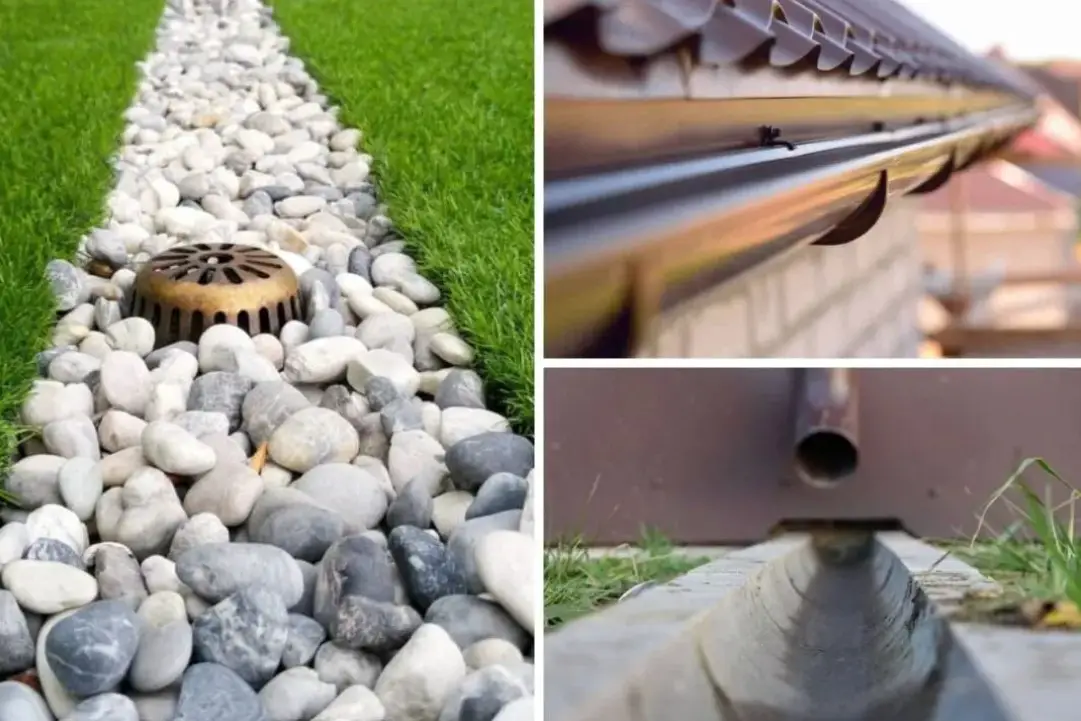Alternatives to rain gutters for your Home
Alternatives to rain gutters are an important addition to any home, but there are several alternatives that can provide the same level of protection without the expense or hassle of traditional gutters.
Alternatives such as rain chains, gutter guards, and other systems are designed to direct water away from your home’s foundation and protect it from water damage.
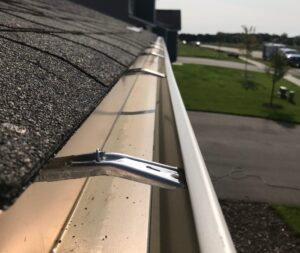
Rain chains are a decorative alternative to traditional gutters. They act as an attractive water feature when it rains, with the sound of cascading water that can be soothing. Rain chains can be made from various materials such as copper, stainless steel or aluminum and come in a variety of designs.
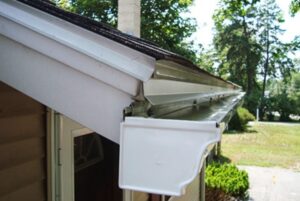
Gutter guards are another option that can be used to help protect your gutters from clogging. These guards are placed over the existing gutter system and act as a filter, catching debris before it can enter the gutters. This helps prevent water damage caused by clogged gutters and reduces maintenance costs associated with regular gutter cleaning.
Top 7 Best Gutter Alternatives for Your Home
Rain gutters are a necessary part of any home’s exterior to help collect and divert water away from your foundation and prevent damage. But when installing rain gutters for the first time, there are some alternative solutions available that can be more suited to your property and its environment.
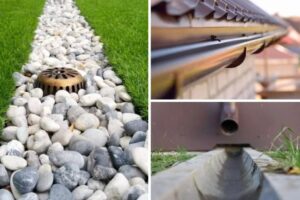
We present a top 10 list of the best gutter alternatives for your home, each with its own advantages and drawbacks.
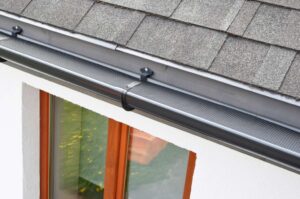
Rain Chains: These are decorative metal chains that serve as an alternative to traditional gutters by allowing the water to cascade down in a gentle stream. They can be very attractive, but may not be suitable if you get heavy rain or experience high winds in your area.
Drip Edge
Drip edge is a key component of any water management system, whether it is a gutter or other rainwater management system. Drip edges are always along the edges of the roof or shingles and are an important part in keeping water from running down the fascia boards and soffits, which can lead to wood rot.
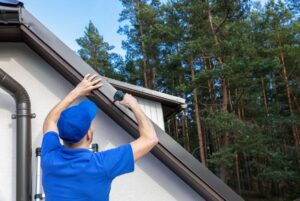
Drip edges allow rainwater to drip directly downwards instead of trickling off the roof and flowing along the siding. Drip edges are essential for effective water management, and should be installed on all homes regardless of whether or not a gutter is present. Drip edge materials vary depending on climate and specific needs, such as aluminum being ideal.
Drip Path
When it comes to effective rainwater management, drip paths are a great alternative to traditional gutters. Drip paths consist of large pavers or blocks that are installed at an angle, running along the roofline and directed away from the house.
These blocks can be composed of various materials such as plastic, metal, or even concrete, making them easy to customize depending on your needs.
Drip paths are also very simple to install around the perimeter of your home, and they can be used in combination with drip edges to create a comprehensive rainwater management system.
With its customizable components, ease of installation, and effectiveness at directing water away from your house, a drip path is an ideal solution.
Underground Rain Chain
An underground rain chain is an efficient and aesthetically pleasing way to collect rainwater and direct it away from your home. It consists of two components: the above-ground rain chain that attaches to the edge of your roof, and a below-ground drainage system where the water is directed.
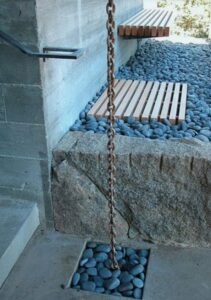
The above-ground rain chains come in various styles and materials, so you can find one that fits the look of your home. They are also easy to install and don’t require any major changes to your roofline.
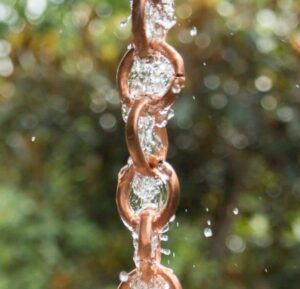
The below-ground drainage system is usually best for professionals to install, but it is a relatively simple process.
Above-ground Rain Chain
An Above-Ground Rain Chain is an efficient and visually appealing way to manage rain water run-off. Unlike traditional underground drainage systems, Above-Ground Rain Chains attach directly to the edge of a roof and direct water away from the home.
These Above-Ground Rain Chains consist of a series of metal or ceramic links connected in a chain form that direct the water downward. As the water cascades down the chain, it collects in a rain barrel or is directed into a french drain to be diverted away from your home’s foundation.
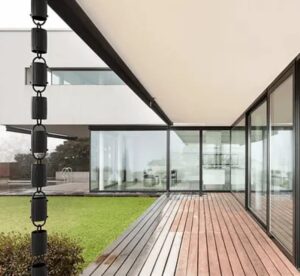
Above-Ground Rain Chains are an attractive and functional way to manage unwanted rainwater around your home.
Ground Gutters or French Drain
Ground gutters, also known as french drains, are an effective and widely used form of rainwater management. They are installed underground along the perimeter of a home and designed to collect rainwater that falls off the roof, and direct it away from the foundation.
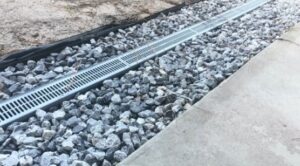
Ground gutters typically consist of perforated PVC or plastic pipes, making them easy for professionals and most DIYers to install.
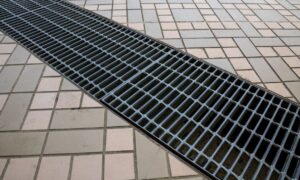
The installation process does involve a bit of digging, but nothing too complicated.
Copper Gutters
Copper gutters are an excellent choice for homeowners looking for a durable, low-maintenance gutter system. Copper gutters are made from copper alloy sheets, which are thicker and more durable than traditional aluminum gutters.
Copper is also resistant to corrosion and rust, making it a great option for homes in areas with humidity or salty air. Copper gutters are also low-maintenance and easy to clean, so you won’t have to worry about frequent repairs or maintenance.
In addition to their durability and protection against corrosion, copper gutters also offer a great aesthetic touch to any home. Copper has a classic look that will boost curb appeal and add a touch of elegance to any exterior. Copper gutters come in a variety of styles, so you can find the perfect match for your home’s architecture and design.
Overall, copper gutters are an excellent option for homeowners looking for a durable, low-maintenance gutter system with classic beauty.
Built-in/Hidden Gutters
Hidden gutters are a great alternative for homeowners who want the benefits of having gutters without detracting from the aesthetics of their home. Built-in gutters are installed behind the roof eaves and are completely hidden from view. This means they won’t detract from the overall look of your home, while still providing all of the functionality of traditional.
Frequently Asked Questions:
Is it OK to not have gutters?
Gutters are an essential part of a home’s exterior, yet they are often overlooked when it comes to regular maintenance. Is it OK to not have gutters? The short answer is no. Gutters are necessary for most homes in order to protect the building from water damage caused by rainwater runoff.
Without them, rainwater can damage the foundation, siding, and roof of a home, leading to costly repairs. Gutters also help to prevent flooding in basements and protect landscaping from erosion due to water runoff.
In addition, gutters provide an outlet for trapped air that can build up around the eaves of the house. This trapped air can cause ice dams in the winter, leading to further damage. For these reasons, gutters are an essential element of a home’s exterior and should not be overlooked or neglected.
What happens if your house doesn’t have gutters?
Gutters play an important role in keeping your home safe from damage. Without gutters, rainwater can collect on a house’s roof and create excess weight, which can cause the foundation to settle or even crack. The water can also seep into walls and other vulnerable areas, leading to mold and mildew growth. What’s more, it can also damage the siding of your home by causing wood to rot and paint to peel. So if you don’t have gutters on your house, it is important to consider getting them installed in order to avoid costly repairs down the road.
How do you handle rain runoff without gutters?
Rain gutters are a common solution for diverting rainwater away from homes, but it isn’t the only option. There are several more creative solutions that can help reduce the amount of water impacting your home’s foundation and landscaping in addition to protecting against potential damage caused by standing water.
One option is a rain dispersal system, which consists of metal edging that is installed in locations under the roofing shingles. This can help to keep water from running down along walls and windows and protect them from damage.
For a more decorative solution, you can install a rain chain—typically made out of copper or aluminum metals—instead of traditional gutters. This can provide an attractive water feature for your home’s exterior while still providing the same level of protection from rainwater runoff.
Finally, if you want to avoid installing anything new, you can consider yard re-grading. This allows you to re-slope the yard so that the flow of water runs away.
Why do modern homes not have gutters?
Modern homes are not equipped with gutters for a few reasons. One major reason is the improved design of roofs, which now feature slanted slopes and overhangs that make gutters unnecessary in most cases. This type of roofing helps direct water away from the base of the home and towards the ground, reducing potential damage to the foundation.
Do rain chains work without gutters?
Rain chains can be a stylish and functional addition to your home, even without gutters. With the right style of rain chain, you can capture enough water to make it a worthwhile addition to your home. Cup-style rain chains are typically able to handle more water than link-style varieties, due to their greater capacity for collection.
What are the cheapest DIY gutters?
Vinyl gutters are an excellent choice for DIYers looking to save money without compromising on quality. They cost around $2 per linear foot, making them the least expensive material for gutters. Vinyl is also less prone to corrosion and rust than metal materials, so it’s ideal for areas that experience harsh weather conditions. Read also…

